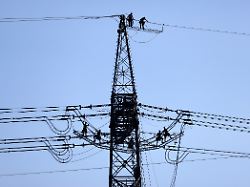Billion dollar relief
Federal government wants to reduce electricity prices for businesses
November 9, 2023, 11:37 a.m
Listen to article
This audio version was artificially generated. More info | Send feedback
The traffic light coalition has been struggling for months over an industrial electricity price. Now there is an agreement: The electricity price for the economy should be reduced with a significant tax cut – and there should also be help. The FDP speaks of a “big hit”.
The federal government wants to reduce the price of electricity for the economy through tax reform. The plan includes, among other things, a significant reduction in electricity tax for the manufacturing industry and an expansion of the current electricity price compensation for corporations that particularly suffer from high electricity prices. The electricity tax should therefore be reduced from currently around two percent to the European minimum of 0.05 percent. Not only large industrial groups benefit from this, but also medium-sized businesses.
350 companies that are particularly exposed to international competition and suffer from high electricity prices are to receive additional help. The existing electricity price compensation is to be extended and expanded for five years.
The Federal Cabinet recently decided to provide further relief: the federal government wants to provide a subsidy of up to 5.5 billion euros to partially finance the transmission network costs. In the end, this should also curb the price of electricity. Network charges are fees for the use of electricity and gas networks that are passed on to consumers. Next year alone there will be relief of around twelve billion euros.
Electricity prices in Germany are high in comparison
The federal government had been arguing for months about ways to relieve the industry of electricity prices. As “Spiegel” reports, Chancellor Olaf Scholz, Finance Minister Christian Lindner and Economics Minister Robert Habeck are said to have made the agreement “in the closest circle”.
In international comparison, the German electricity price is currently quite high – both for consumers and for companies, some of which require enormous amounts of energy. This is particularly true, for example, for the chemical industry, aluminum plants and manufacturers of building materials. According to data from the International Energy Agency, industry in Germany pays almost three times as much per megawatt hour as in the USA or Canada.
In the EU, Germany is in the middle: electricity is more expensive in Denmark and Italy, but much cheaper in France. The high price in Germany is due, on the one hand, to the formerly strong dependence on Russian gas. Germany has only a few oil and gas reserves of its own, and hydropower and sun can also be better used to generate electricity elsewhere. Added to this are the CO2 price, taxes and duties.
More and more large industrial groups are now thinking loudly about relocating their production to countries with lower electricity prices. That could cost Germany jobs. Economics Minister Habeck therefore suggested in May that electricity prices for industry could be artificially reduced through state subsidies. This should happen temporarily until 2030 – until renewable energies are so expanded that electricity prices fall on their own. Cost: around 25 to 30 billion euros.
Habeck’s plans were controversial
However, the Green politician’s plans were sharply criticized because only around 2,500 particularly energy-intensive companies should benefit from the low prices. The middle class, many craftsmen and smaller companies would come away empty-handed. There is also the risk of state support for an industry that is not sustainable at all. The “economics” Monika Schnitzer said that this threatened to slow down the urgently needed structural change. Other economists also made similar comments, doubting that electricity would ever really become cheap, even with a significant expansion of renewable energies.
Chancellor Olaf Scholz warned that the expansion of wind and solar energy should not come to a standstill. It’s also about companies that make a lot of profit. Finance Minister Christian Lindner emphasized: “There is no financing of this magnitude available.” The FDP politician brought up the idea of reducing the electricity tax – for everyone “from Bafög recipients to pensioners, from craft businesses to the manufacturing industry”.
The planned reduction in electricity tax for industry is applauded by the FDP. Parliamentary group leader Christian Dürr spoke of a “big hit”. “It always makes more sense to cut taxes directly rather than offset high taxes with subsidies,” he said. Dürr explained that he thought it was right that the coalition chose the path suggested by Finance Minister Lindner. “An industrial electricity price would have consumed huge amounts of tax money without bringing prices down in the long term. In the end, small businesses and private consumers would have had to pay for this with their taxes,” said Dürr.
